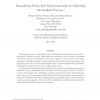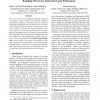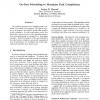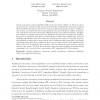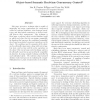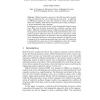108
click to vote
RTSS
1994
IEEE
15 years 6 months ago
1994
IEEE
This paper presents a comprehensive design methodology for guaranteeing end-to-end requirements of real-time systems. Applications are structured as a set of process components co...
170
click to vote
RTSS
1994
IEEE
15 years 6 months ago
1994
IEEE
The use of caches poses a difficult tradeoff for architects of real-time systems. While caches provide significant performance advantages, they have also been viewed as inherently...
123
Voted
RTSS
1994
IEEE
15 years 6 months ago
1994
IEEE
The problem of uniprocessor scheduling under conditions of overload is investigated. The system objective is to maximzze the number of tasks that complete by their deadlines. For ...
115
Voted
RTSS
1994
IEEE
15 years 6 months ago
1994
IEEE
Various concurrency control algorithms di er in the time when con icts are detected, and in the way they are resolved. In that respect, the Pessimistic and Optimistic Concurrency ...
RTSS
1993
IEEE
15 years 6 months ago
1993
IEEE
146
click to vote
RTSS
1993
IEEE
15 years 6 months ago
1993
IEEE
Studies in [7,8, 91 concluded that for a variety of reasons, optimistic concurrency control appears well-suited to real-time database systems. Especially, they showed that in a re...
114
Voted
RTSS
1993
IEEE
15 years 6 months ago
1993
IEEE
This paper presents a technique that is capable of supporting two major requirements for concurrency control in real-time databases: data temporal consistency, and data logical co...
116
Voted
HYBRID
1997
Springer
15 years 6 months ago
1997
Springer
Abstract. The theory of formal verification is one of the main approaches to hybrid system analysis. Decidability questions for verification algorithms are obtained by constructi...
136
click to vote
HYBRID
1997
Springer
15 years 6 months ago
1997
Springer
Hybrid transition systems in their full generality describe continuous behaviour by a set of equations in each mode an algebraic or di erential equation for each state variable in ...
